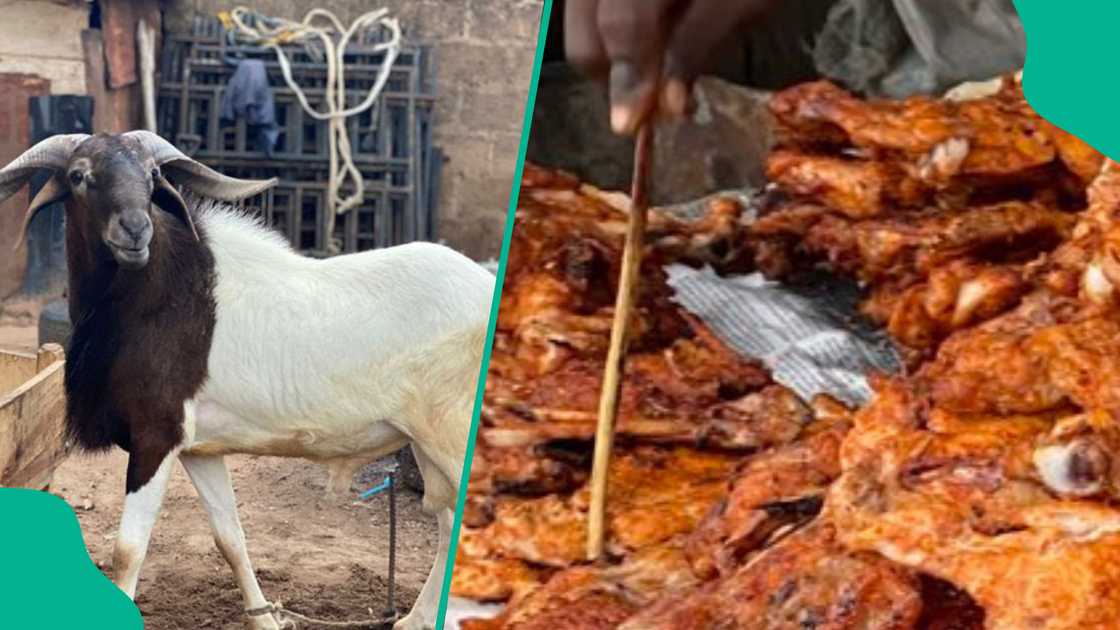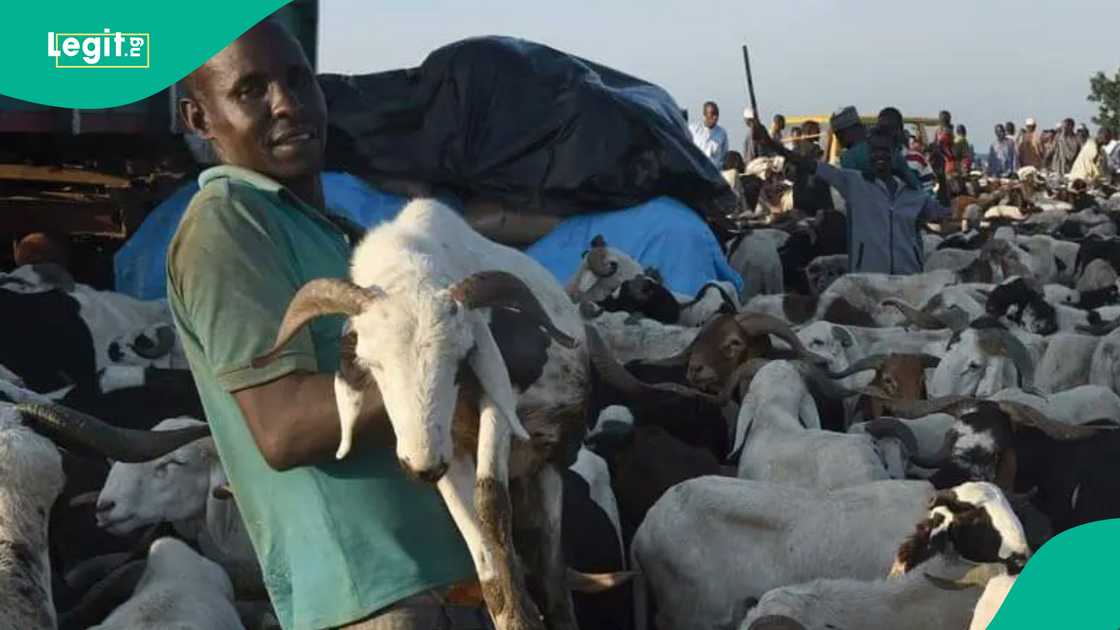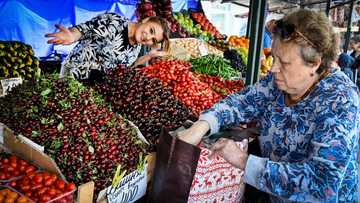Kano: How Sallah Meat Surplus Left Suya Sellers Struggling
- Suya sellers in Kano are lamenting a sharp decline in business following the recent Sallah celebrations as many residents sacrificed rams and cows
- Legit.ng reports that though the festive atmosphere of Eid-el-Kabir (Sallah) in Kano has faded, for the city’s suya sellers, the aftermath has been far from celebratory
- Instead of the usual post-Sallah 2025 boom in business, vendors are now grappling with an unexpected slump as residents, stocked with meat, have little appetite for the popular grilled delicacy
Kano, Kano state - Suya, a popular staple street food in Northern Nigeria, is typically in high demand, especially during festive periods when social gatherings and outdoor events increase.
However, in 2025, sellers disclosed to Legit.ng that the tradition of ram sacrifice during Sallah has left households with so much meat that many see no need to buy suya.

Source: Twitter
Malam Ahmed Musa, a suya seller at Wudil Market, has been in the business for over 15 years. He told Legit.ng's correspondent in Kano that the sales in 2025 have been the worst he has experienced in recent memory.

Read also
US-based woman who moved to Nigeria buys house in Lagos after searching for apartment, shows building
He lamented:
“Before Sallah, we were selling up to 200 sticks a night. Now, we struggle to sell 50. People have too much meat at home, and even those who usually buy suya as a quick snack are not coming."
To attract customers, some sellers have resorted to drastic price reductions while others have temporarily closed.
A stick of suya that previously sold for N2,000 is now going for three sticks at N5,000 in some areas. Yet, even these discounts have done little to revive sales.
Ibrahim Sani, who operates a suya spot near Wudil river, said his daily earnings have dropped by more than half.
He explained:
“We used to make at least N80,000 a night, but now we barely make N20,000. The worst part is that we still have to buy beef at the same price, so our profit is gone."
Kano residents confirm shift in consumption habits
Several Kano residents admitted that the abundance of Sallah meat has changed their eating habits.
Mrs. Aisha Yusuf, a housewife in Rijiar Zaki, said her family has been consuming home-cooked meat for days.
She said:
“We killed a ram, and our relatives also shared meat with us. Right now, we have no reason to buy suya because our freezer is full."
Similarly, Alhaji Abdullahi Bello, a civil servant, noted that his family prefers to finish their Sallah meat before spending on suya.
He said:
“Why should I spend extra money when we still have plenty at home? Maybe in a week or two, we will start buying suya again."
Despite the current downturn, a few vendors believe the situation will improve in the coming weeks.
Malam Sani Mohammed, who sells suya at Hotoro Eastern Bypass, said demand usually rebounds once households exhaust their meat reserves.
He said:
“This happens every year, but this time it is worse. Still, I know customers will return soon. Suya is too delicious to ignore for long."
Meanwhile, other sellers, however, are not as optimistic. Malam Kabiru, who operates near BUK Road, fears that if the trend continues, some vendors may be forced to temporarily close their businesses.

Read also
Basket of tomatoes, peppers to sell at new prices after Sallah celebrations, traders give reasons
He said:
“If sales don’t pick up in the next week, I might have to temporarily stop buying meat in bulk. I cannot afford to keep losing money every day."
Economic ripple effects
Findings by Legit.ng also reveal that the decline in suya sales is also affecting other parts of the local economy.
Beef suppliers, who usually experience high demand before and after Sallah, say their sales to suya vendors have dropped significantly.

Source: Twitter
“Many of our regular buyers are ordering less because they can’t sell as much suya," said Alhaji Yusuf, a meat distributor at Kano Abattoir.
Meanwhile, groundnut oil sellers, who supply suya vendors with essential ingredients, have also noticed a dip in business.
“Our sales to suya makers have reduced by almost 40%” said Hajiya Fatima, a spice merchant at Rimi Market.
Read more Kano news:
- Drama as Sanusi, Bayero hold 2 different Eid-el-Kabir prayers in Kano
- Angry Kano man bites wife's cheek to prevent her from going out

Read also
Ojude Oba 2025: Viral moment Gen Z baddie threatened to sue old man at event ignite drama online
Kano experiencing high demand for ORS
Earlier, Legit.ng reported that as temperatures soar in Kano state during the 2025 Ramadan, residents are increasingly relying on Oral Rehydration Salts (ORS) to stay hydrated and maintain energy levels while fasting.
The intense heatwaves, often exceeding 40°C, have led to a surge in demand for ORS, with local patent medicine stores reporting a significant rise in sales.
Source: Legit.ng

Ridwan Adeola Yusuf (Current Affairs Editor) Ridwan Adeola Yusuf is a content creator with more than nine years of experience, He is also a Current Affairs Editor at Legit.ng. He holds a Higher National Diploma in Mass Communication from the Polytechnic Ibadan, Oyo State (2014). Ridwan previously worked at Africa Check, contributing to fact-checking research works within the organisation. He is an active member of the Academic Excellence Initiative (AEI). In March 2024, Ridwan completed the full Google News Initiative Lab workshop and his effort was recognised with a Certificate of Completion. Email: ridwan.adeola@corp.legit.ng.

Usman Bello Balarabe (Kano Correspondent) Kano's regional correspondent, Usman Bello Balarabe is a journalist, media strategist, and university lecturer in the state. He worked as an investigative journalist with Daily Trust Newspaper Nigeria. His career is passionately geared towards stimulating social justice, exposing corruption, ensuring good governance and accountability. In his over 7 years of journalism practice, he has authored investigations and numerous special and beat reports at the intersection of environment, health, education, agriculture, public spending, security, and politics.

